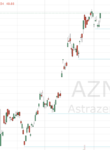Well good; Now what is parabolic sar and/or atr? The stock is AZN it's been going up for a few months. I think maybe its time to get out I'm up over $10 a share. I was thing of putting in a stop loss of about two dollars down and watch it. I have an order in now to sell at $61. I would really like to hold it if possible until after the ex-dividend date which will probably be some time in Feb.
First assumption you appear to have made is that price going up means price likely to continue going up (price going down means price likely to continue going down). It is a common assumption.
It is not valid. If you base your learning on invalid assumptions, you are not going to be making optimal choices, which will likely mean that you do not achieve your goals whatever they may be.
If you had not made that assumption, you would sell now what you believe to be no longer going up, instead of choosing to sell it for $2 less. Unless you think the drop of $2 gives you information about the future potential movement of the stock that you couldn't otherwise get. This theory should already be tested and proven to your standards before making investment decisions.
You mention your average price and your unrealised gain/loss. Irrelevant. Your entry price has nothing to do with the future probabilities of the stock moving up and down. Just use mark to market accounting. Consider that you've taken a gain/loss at the close each trading day, just like the futures markets. You're long from the closing price last night. The only time your cost basis is relevant is in calculating gains/losses for tax purposes, which is an entirely different subject.
If you own a stock, why have a stop loss order? If the company goes bankrupt, you will lose your investment. That is what correct asset allocation and diversification is for. Do not be over-weight any one stock, do not speculate with more than you can afford to lose. There is no need for a stop loss order, you simply sell the stock when you can allocate your capital more productively elsewhere (a better performing stock or other asset class).
If you own stock on margin, then you can be forced out of your position by an adverse movement in the stock. This is trading beyond your means and should not be done by beginners. In order to use leverage effectively you need to have developed an accurate and reliable trading method. Even then, the choice of leverage / stop placement is not simple to get right, and if one gets it wrong profits can be reduced or the strategy rendered unviable by too many 'stop outs'. It is down to the level of market knowledge, skill of the operator, and ensuring stop orders are placed outside of the expected volatility for that market cycle.
Leveraging up and then placing stop loss orders based on guesswork is gambling. Owning a stock outright and deciding to sell it on stop at a worse price is little better. If you have a 10 point gain in the stock, you are gambling with minimum 20% of your proceeds for no discernible reason.
Bulls profit, bears profit, hogs get slaughtered. Don't be greedy. If there is no reason to stay in, get out at the market. Ideally you should have clear, tested, and well reasoned criteria for entering and exiting.
Dividend capture is another subject entirely. If you wish to look for dividend capture opportunities, treat that as a separate strategy. Dividends alone do not justify the market risk of owning a stock for six weeks. Why not sell out of the stock now, and then before the ex-div date calculate whether you can make an acceptable dividend capture trade?
There is a lot to learn in this business - how much you need to know will depend on your goals and level of interest. There are few obvious or easy answers, and you'll need to do your own thinking. Being told to use ATR or placing stop orders around so called swing points isn't going to make you a better trader or investor. Doing what is done by the average person will get you average results. Find out what the average result is for an independent speculator and decide if you want to aim highter than that.
I too came to this board to learn more about markets some seven years ago. I spent a year chasing my tail and 'learning' what turned out to be absolute nonsense until a successful trader took me under his wing and showed me how illogical all the mainstream assumptions were. I chose to listen, and endeavoured to learn how to think for myself. Others with the same opportunity chose a different path. Your choice is up to you.

